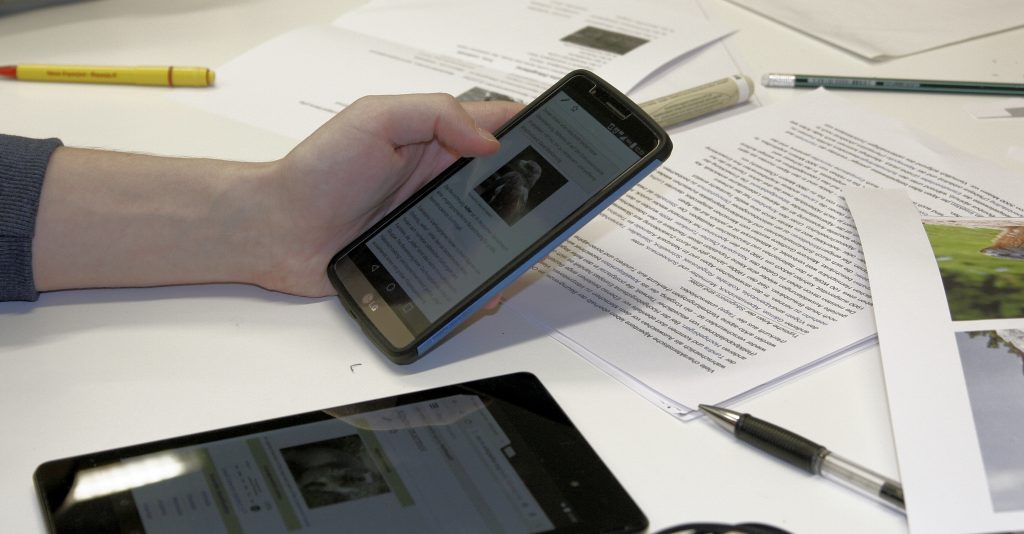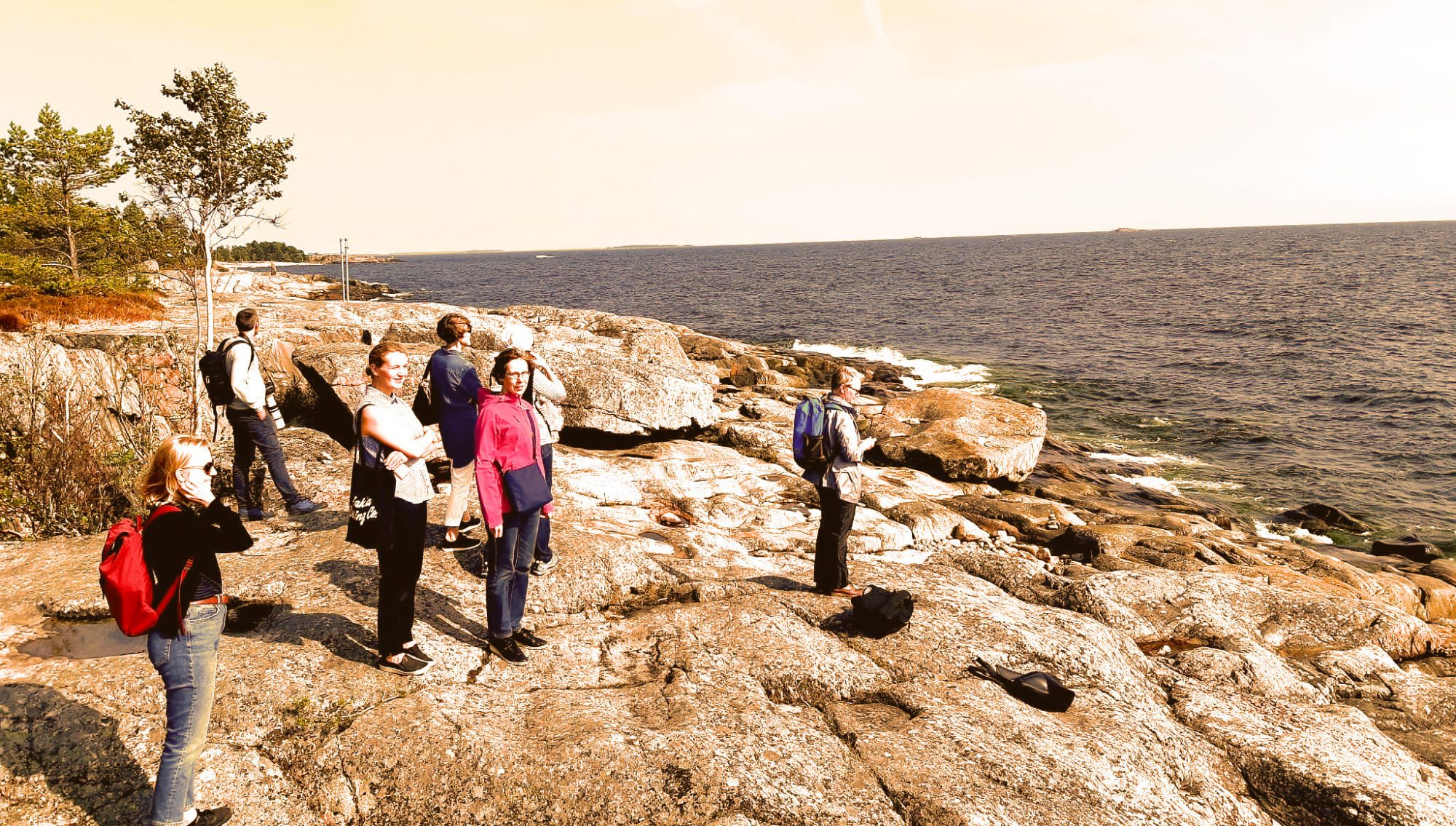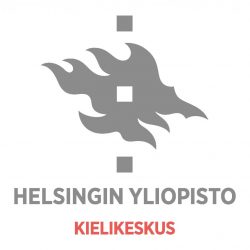 In 2009 I started a creative writing workshop as an Advanced English course at the Language Centre, focusing on English as an open field where learners develop fluency and invest emotional depth in their L2. I saw that the “creative” in creative writing fosters autonomy and brings learners to the center as makers and deciders in all aspects of their writing. Over the years since, colleagues have joined in using this key for opening doors in learning, including José Ruiz, whose Spanish creative writing workshop helped participants better understand language, the world and themselves; Michele Simeon, whose creative writing tasks open academic writers to finding enjoyment in the writing process; and Leena Karlsson, who emphasizes creativity in all of a learner’s writing as an avenue to authenticity and humanity.
In 2009 I started a creative writing workshop as an Advanced English course at the Language Centre, focusing on English as an open field where learners develop fluency and invest emotional depth in their L2. I saw that the “creative” in creative writing fosters autonomy and brings learners to the center as makers and deciders in all aspects of their writing. Over the years since, colleagues have joined in using this key for opening doors in learning, including José Ruiz, whose Spanish creative writing workshop helped participants better understand language, the world and themselves; Michele Simeon, whose creative writing tasks open academic writers to finding enjoyment in the writing process; and Leena Karlsson, who emphasizes creativity in all of a learner’s writing as an avenue to authenticity and humanity.
After ten years, my workshop course is running strong, and learners from the various academic faculties produce some very good fiction and poetry. Liberated from narrow academic style, provided with opportunities for ambition and excellence, they discover joy in the work, developing confidence in, and reflection on, their writing. Participants move past preoccupation with academic formulas and premature focus on “perfection” and are led to find a fuller identity in English. These results echo my colleagues’ and are rooted in creative writing’s nature.
Creative writing, accessible to all learners and attractive to most, pushes writers to their communicative abilities’ limits. Its practice is a good vantage for seeing conventions not as laws but as tools, for seeing language itself as a feast for the senses and for seeing the vocabulary of courteous, frank feedback as heartfelt communication. In playing with and even evading the “rules,” writers discover new tools and learn to make and live with their own writing-related decisions.
My foundation is a belief in each writer’s individuality and in their ability to access an individual voice by taking responsibility for it. A writer’s voice emerges from a range of distinctive combinations of tone and subject that allow identity to be shown. To encourage this development, learners are respected as having other knowledge, rather than being regarded as having less knowledge.
To foster their sense of authority as writers, learners are free in choosing what to write and when to write it. This freedom takes getting used to: student writers tend to think their academic writing is not fully theirs, that in it they are captive to a limited range of stock phrases and the conflicting demands of “experts”.
My time with learners is spent discussing their writing and stimulating writers to analyze and respond to their texts’ reception by readers. The workshop mainly addresses aesthetic, not grammatical, issues. We look for three basic aims in learners’ writing: “showing, not telling”; writing for the five senses; and emphasizing credibility over fact. Initially, these all run counter to the academic tendency towards abstraction and analysis, but they ultimately add flexibility and strength to fact-based writing, too. We also work on perspective (point of view, characterization), pull (conflict, suspense, openings, resolutions), phonosemantics (perceived links between sound and meaning) and awareness of breath (rhythm, phrase length).
The L2 workshop stresses imagination, for promoting fluency and facility, and craft, for building skills, critiquing and modeling possible revisions. We foreground the creative urge that “I am whoever I want to be.” This liberation is empowering, propelling L2 learners past obstacles in academic and professional discourses. Beyond this, there still shines the goal of using language to explore ourselves and more fully communicate our humanity. Writers approach this last goal more daringly and surpass limited L2 conceptions of themselves through the freedom to make, intrinsic to creative writing.
Text: Paul Graves
Comments by other Language Centre teachers using creative writing as a teaching method in foreign language acquisition:
Academic writing, laden with rules, conventions and assessment, leaves many student writers uncertain of their own voice and abilities. I use informal creative writing tasks combined with non-evaluative feedback to foster enjoyment of the writing process. These are typically freewriting prompts on personal experiences, resonant of StoryCorps founder Dave Isay’s idea that “Everyone around you has a story the world needs to hear.”
Text: Michele Simeon, university teacher in English
Kirjallisen tekstin kirjoittaminen on yksi tapa ymmärtää meitä ympäröivää maailmaa ja meitä itseämme. Se on sisäinen matka, kielen leikki, jolla kertoa tarinaa, kuvitelmaa, joka voi kuitenkin viedä meidät kohti jotain varmaa ja aitoa.
Luovan tekstin kirjoittaminen vieraalla kielellä tarkoittaa kirjoittamista toisenlaisen prisman läpi. Kirjoittaminen tällä tavalla pakottaa meidät katsomaan maailmaa toisen silmin: sen kielen ja kulttuurin silmin, jota opiskelemme. Tästä syystä kyseessä on kielten opiskelijoille erityisen arvokas opintokokonaisuus. Sanaston ja kieliopin lisäksi opiskelija pohtii vieraan kielen käyttöä itse luomissaan tilannekonteksteissa sekä miettii, miten muut käyttävät kyseistä kieltä luodessaan dialogeja. Yleisesti ottaen oppilaat tuntevat myös tarvetta ja kiinnostusta lukea opettajan ehdottamaa kirjallisuutta ja monesti he pyytävät lisää luettavaa.
Luovan kirjoittamisen kurssi poikkeaa todella paljon mistä tahansa muusta kurssista mitä olen pitänyt. Se on kurssi, jossa opiskelijoiden välinen etäisyys voi kadota, ja yhteenkuuluvaisuuden sekä läheisyyden tunne voivat olla voimakkaita.
Teksti: José Ruiz Rubio, espanjan opettaja
Oman kirjoittamispedagogisen (ja tutkimuksellisen) ajatteluni perusta on luovuus kirjoittamisessa enkä oikeastaan opeta luovaa kirjoittamista sinällään. Luovuus kirjoittamisessa on osa kaikenlaisen kirjoittamisen prosesseja, palanen kunkin opiskelijan omaa kirjoittamisen ekologiaa ja hänen autobiografiastaan kumpuavaa, aikaan ja paikkaan sidottua. Se liittyy saumattomasti oppimisen reflektointiin ja kirjoittamalla (kielenkin) oppimiseen. Luovuus ja oppijan autonomia kulkevat käsi kädessä ja antavat vapauden ilmaista omia ajatuksia, omilla sanoilla, sillä äänellä, joka kullakin kielenoppijalla/käyttäjällä on.
Kannustan kokeilevaa ja tutkivaa kirjoittamisotetta, genrerajoja ylittävää, luonteeltaan luovaa ja leikillistä, ajatuksia synnyttävää ja terapeuttistakin. Kokeileva kirjoittaminen auttaa kielipelkoon ja luokkahuonekammoon. Sillä on myös vaikutusta siihen, miten tulevat akateemiset ja ammatilliset tekstit tekeytyvät: kokeileva kirjoittaja on tekstintuottajana nöyrä ja ajattelee lukijaansa ihmisenä, jolle on kommunikoitava vailla lähtökohtaista paremmin tietäjän asennetta.
Teksti: Leena Karlsson, englannin yliopistonlehtori

